 It is being reported that MySpace-owner, News International, is looking to expand its presence in Europe with its focus being London.
It is being reported that MySpace-owner, News International, is looking to expand its presence in Europe with its focus being London.
MediaBulletin claims MySpace are opening offices in London, while expanding their connections into the entertainment businesses in the UK capital. They hope to grow the number of UK users beyond the estimated 2m that currently use it.
MySpace considered
Why has it been such a popular thing?
It’s a clever, cut down version of what anyone can do on the Web for themselves using separate software tools and service, but it offers the tools in one place. The unkind are calling it GeoCities 2.0, which isn’t too far from the truth.
 Importantly it also has social/network effects built it. This works both for the creators, as they grow their links to their friends – real and imagined; but importantly for MySpace’s income, the network effect for browsers is huge. As a browser looks at the original site, they split off in a myriad of different directions as they distract themselves, exploring the music taste and hobbies of linked friends.
Importantly it also has social/network effects built it. This works both for the creators, as they grow their links to their friends – real and imagined; but importantly for MySpace’s income, the network effect for browsers is huge. As a browser looks at the original site, they split off in a myriad of different directions as they distract themselves, exploring the music taste and hobbies of linked friends.
Looking around it is addictive, and engrossing, but it’s ultimately an unrewarding empty experience.
Getting to here
The way MySpace has ended up has been very fortuitous. Whether this is intentional or if it’s due to a number of happy coincidences is unclear.
MySpace originally was swamped by children and teenagers when it started two years ago – possibly attracted by its relative safety and that their mates were on it.
 It’s expanded beyond this now and has now reached the point where record companies feel bands _must_ have their own presence on MySpace, even if they’ve got their own Web presence – witness sons of Ventnor, The Bees.
It’s expanded beyond this now and has now reached the point where record companies feel bands _must_ have their own presence on MySpace, even if they’ve got their own Web presence – witness sons of Ventnor, The Bees.
The hard-nosed commercial reality is that bands would be foolish not to be on MySpace. With 35m active users is claimed, the potential audience is too huge to ignore.
Here comes the competition
Other companies are well aware of the value of shared spaces like this – their attention focused by the $580m the News International paid for MySpace. This was highlighted by Microsoft spending a fair bit of cash at SXSW try to get the music companies interested in being on MSN Spaces – their looky-likey offering.
 With the media footprint that News International has, it’s highly likely that they’re going to be able to make best value from what appears to be a considerable purchase price. Already there’s been reports their UK tabloid, The Sun, is to being brought onto MySpace using MySun.
With the media footprint that News International has, it’s highly likely that they’re going to be able to make best value from what appears to be a considerable purchase price. Already there’s been reports their UK tabloid, The Sun, is to being brought onto MySpace using MySun.
With the backing of Murdoch, MySpace _will_ become more of people lives than it is now, and they’ve reached such a point of saturation that the likelihood of them being displaced is low, at least in the short term. If reports of expansion are correct, UK and European residents can expect to be hearing a lot more about MySpace.
 It’s thought that the forthcoming UK chart show, released on Sunday, run by the terribly formal sounding Official UK Charts Company, will be the first time a Number 1 will be a non-physical product. Translated – Crazy by Gnarls Barkley has only been released electronically, as a download.
It’s thought that the forthcoming UK chart show, released on Sunday, run by the terribly formal sounding Official UK Charts Company, will be the first time a Number 1 will be a non-physical product. Translated – Crazy by Gnarls Barkley has only been released electronically, as a download.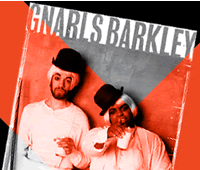 Those Chart cat’s are exactly what you’d call ‘with it’ are they? But I guess we know that given how long it took the music companies to pull their fingers out and start to grab hold of the digital revolution – actually there’s many who’d argue that they still haven’t.
Those Chart cat’s are exactly what you’d call ‘with it’ are they? But I guess we know that given how long it took the music companies to pull their fingers out and start to grab hold of the digital revolution – actually there’s many who’d argue that they still haven’t. UK Mobile company, Orange, is to abandon their numbered Talk plans to replace them with ‘types’ – Dolphins, Canaries, Racoons and Panthers.
UK Mobile company, Orange, is to abandon their numbered Talk plans to replace them with ‘types’ – Dolphins, Canaries, Racoons and Panthers. Orange has always been a pioneer in dealing with customers. This started with their name, which back in 1994, was extremely adventurous – as was tying it in with a colour and trying to associate it with emotion.
Orange has always been a pioneer in dealing with customers. This started with their name, which back in 1994, was extremely adventurous – as was tying it in with a colour and trying to associate it with emotion. On a personal note – I’ve been with Orange since they started and was highly impressed in the early days. Over the years I found that the quality has gone south a little – people you speak to there are a little less helpful; the flexibility that made you glad to be with Orange and started to atrophy shortly after Wanadoo (France Telecom) took over in 2001.
On a personal note – I’ve been with Orange since they started and was highly impressed in the early days. Over the years I found that the quality has gone south a little – people you speak to there are a little less helpful; the flexibility that made you glad to be with Orange and started to atrophy shortly after Wanadoo (France Telecom) took over in 2001.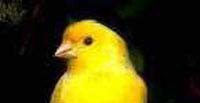 Instead we will be categorised as Dolphins, Canaries, Racoons or Panthers. Here’s the explanation …
Instead we will be categorised as Dolphins, Canaries, Racoons or Panthers. Here’s the explanation … Global revenue from music downloaded onto mobile phones went through the roof last year, with pundits predicting that the only way is up for the next five years.
Global revenue from music downloaded onto mobile phones went through the roof last year, with pundits predicting that the only way is up for the next five years.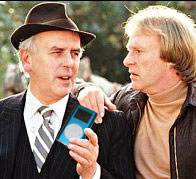 How to make a mint from mobile music
How to make a mint from mobile music After reporting Google’s
After reporting Google’s  Merrill Lynch analyst Lauren Fine predicted that, “Google’s increased market share and better monetisation of queries will lead to an increased share of ad dollars relative to competitors in the first half of this year.”
Merrill Lynch analyst Lauren Fine predicted that, “Google’s increased market share and better monetisation of queries will lead to an increased share of ad dollars relative to competitors in the first half of this year.” Britain remains in the grip of a texting mania as new figures reveal around 99 million text messages were faithfully banged out on little keypads every day during February.
Britain remains in the grip of a texting mania as new figures reveal around 99 million text messages were faithfully banged out on little keypads every day during February.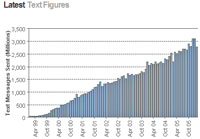 The SMS stats revealed that while love may be – quite literally – in the air, most people preferred to profess it from the comfort of their keypad, with only ten million romantics going to the trouble of sending a proper Valentine’s card through the post.
The SMS stats revealed that while love may be – quite literally – in the air, most people preferred to profess it from the comfort of their keypad, with only ten million romantics going to the trouble of sending a proper Valentine’s card through the post. The MDA has forecast that text messaging figures will reach an annual total of 36.5 billion text messages by the end of 2006, compared to 2005’s 32 billion total.
The MDA has forecast that text messaging figures will reach an annual total of 36.5 billion text messages by the end of 2006, compared to 2005’s 32 billion total. Most built-in MP3/FM/headphone combos are so bulky it looks like the user has got two halves of a tennis ball stuck on their heads, but a new headset from Japanese manufacturers Thanko looks to change all that.
Most built-in MP3/FM/headphone combos are so bulky it looks like the user has got two halves of a tennis ball stuck on their heads, but a new headset from Japanese manufacturers Thanko looks to change all that. Clearly getting carried away with claims about the unit’s diminutive size, the (ahem) ‘ButterFly’ FMP3 comes in two flavours offering 512MB and 1GB flash memory capacities, with the built in MP3 player supporting MP3 and WMA at 32 – 192Kbps data rates.
Clearly getting carried away with claims about the unit’s diminutive size, the (ahem) ‘ButterFly’ FMP3 comes in two flavours offering 512MB and 1GB flash memory capacities, with the built in MP3 player supporting MP3 and WMA at 32 – 192Kbps data rates.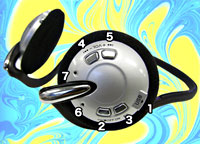 Powered by a non-removable 3.7V lithium ion battery, charged over the USB connection, the hazy web translation suggests that the makers are claiming up to 700 minutes for radio play and 350 – 400 minutes of continuous MP3 playback.
Powered by a non-removable 3.7V lithium ion battery, charged over the USB connection, the hazy web translation suggests that the makers are claiming up to 700 minutes for radio play and 350 – 400 minutes of continuous MP3 playback. With a leather-gloved stroke of the company white cat, Google’s mastermind cackled loudly as new figures revealed that their plans for UK domination are nearly complete, with almost three out of every four searches in the UK using their search engine.
With a leather-gloved stroke of the company white cat, Google’s mastermind cackled loudly as new figures revealed that their plans for UK domination are nearly complete, with almost three out of every four searches in the UK using their search engine. It looks like the Brits have taken a particular shine to the San Francisco-based search giant, with February’s search referral stats outperforming Google’s US average for the the month (55.39 percent) and their global average (62.4 percent).
It looks like the Brits have taken a particular shine to the San Francisco-based search giant, with February’s search referral stats outperforming Google’s US average for the the month (55.39 percent) and their global average (62.4 percent).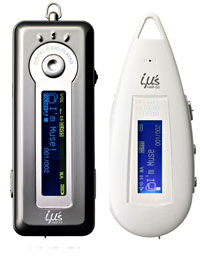 If the market for flash memory-based MP3 players wasn’t overcrowded enough, big name electronics company Hitachi have decided to steam in with a collection of their own.
If the market for flash memory-based MP3 players wasn’t overcrowded enough, big name electronics company Hitachi have decided to steam in with a collection of their own.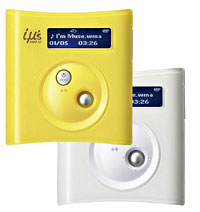 Wrapping up the trio is the HMP-S3, housed in a slightly squashed square form factor and available in yellow or white (you could never accuse the Hitachi designers of being too ambitious with this range).
Wrapping up the trio is the HMP-S3, housed in a slightly squashed square form factor and available in yellow or white (you could never accuse the Hitachi designers of being too ambitious with this range).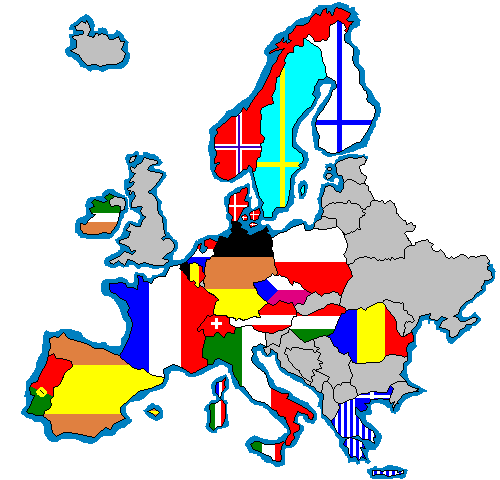 It is being reported that MySpace-owner, News International, is looking to expand its presence in Europe with its focus being London.
It is being reported that MySpace-owner, News International, is looking to expand its presence in Europe with its focus being London. Importantly it also has social/network effects built it. This works both for the creators, as they grow their links to their friends – real and imagined; but importantly for MySpace’s income, the network effect for browsers is huge. As a browser looks at the original site, they split off in a myriad of different directions as they distract themselves, exploring the music taste and hobbies of linked friends.
Importantly it also has social/network effects built it. This works both for the creators, as they grow their links to their friends – real and imagined; but importantly for MySpace’s income, the network effect for browsers is huge. As a browser looks at the original site, they split off in a myriad of different directions as they distract themselves, exploring the music taste and hobbies of linked friends.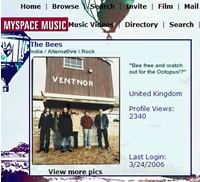 It’s expanded beyond this now and has now reached the point where record companies feel bands _must_ have their own presence on MySpace, even if they’ve got their own Web presence – witness sons of Ventnor,
It’s expanded beyond this now and has now reached the point where record companies feel bands _must_ have their own presence on MySpace, even if they’ve got their own Web presence – witness sons of Ventnor, 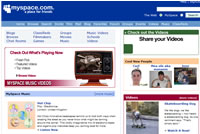 With the media footprint that News International has, it’s highly likely that they’re going to be able to make best value from what appears to be a considerable purchase price. Already there’s been reports their
With the media footprint that News International has, it’s highly likely that they’re going to be able to make best value from what appears to be a considerable purchase price. Already there’s been reports their  Do NOT read this report, if you’re fond of crosswords. Don’t say I didn’t warn you.
Do NOT read this report, if you’re fond of crosswords. Don’t say I didn’t warn you.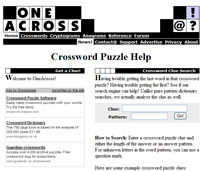 I was being pig-headed. I only had one guess left, and all I knew besides that was that the letter ‘c’ was not one of those used. And if I got it wrong, it was “game over” while if I got it right, it was a thousand points onto the total.
I was being pig-headed. I only had one guess left, and all I knew besides that was that the letter ‘c’ was not one of those used. And if I got it wrong, it was “game over” while if I got it right, it was a thousand points onto the total. I’ll be interested to see if this means I never do crosswords again, or whether I now do them more frequently. Amo’s is bad enough, but
I’ll be interested to see if this means I never do crosswords again, or whether I now do them more frequently. Amo’s is bad enough, but